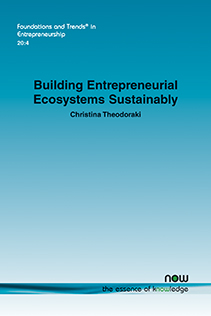Building Entrepreneurial Ecosystems Sustainably
By Christina Theodoraki, IAE, CERGAM, Aix-Marseille University, France, christina.theodoraki@iae-aix.com
Abstract
While entrepreneurship has traditionally been studied from the perspective of the entrepreneur or entrepreneurial enterprise, a modern view emphasizes the importance of the context in which the entrepreneur or enterprise operates. From this perspective, the entrepreneurial ecosystem describes the entrepreneurial context by disentangling the complex interdependent interactions between various organizations (biocenosis) and the milieu/environment in which the entrepreneur or company operates (biotope). However, previous research has neglected to provide a holistic view of the complex dynamics of ecosystems. In response, this study sheds light on the state of the art of this emerging theoretical framework, identifies research gaps that require further investigation, and designs a research program (i.e., the BEES program, Building Entrepreneurial Ecosystems Sustainably) to provide concrete directions for the development of entrepreneurial firms. This program contributes (i) to the theorization of the entrepreneurial ecosystems theoretical stream through a holistic vision; (ii) to a better understanding of the complex strategic dynamics and behaviors in this context; (iii) and to its successful implementation in different contexts. The BEES program facilitates the adoption of an ecosystem approach to building an entrepreneurial society and provides the impetus for the construction of a new school of scientific thought based on the ecosystem approach.
Building Entrepreneurial Ecosystems Sustainably
Entrepreneurship has traditionally been studied from the perspective of the entrepreneur or entrepreneurial enterprise. A modern view emphasizes the context in which the entrepreneur or enterprise operate, the entrepreneurial ecosystem. The aim of Building Entrepreneurial Ecosystems Sustainably is twofold. First, it provides an accurate review of previous work spanning more than a decade that has built a stream of research with a major impact on research and practice. Second, it offers a path of learning, a school of thought, and a concrete direction by providing a research agenda and a program for structuring future research.
The monograph begins by offering invaluable insights through tracing the genesis of ecosystems from earlier theories, identifying research gaps, and mapping the historical evolution of the field. Section 2 sets up the theoretical foundation and depicts the entrepreneurial ecosystem-as-theory. Section 3 introduces a novel view of studying entrepreneurial ecosystems and examines the entrepreneurial ecosystem-as-method. Section 4 approaches the entrepreneurial ecosystem-as-practice and raises the difficulties of adopting such an approach in practice. Section 5 exposes the future research agenda by describing the goal of the BEES (Building Entrepreneurial Ecosystems Sustainably) research program. This program reveals a structured and accurate research path to contribute to entrepreneurial ecosystems for theory and practice. Finally, Section 6 consolidates past scientific contributions, establishes a foundational knowledge base, and guides decision-making toward envisioning and designing an effective research program. The monograph recognizes the entrepreneurial ecosystem as a dynamic framework and reveals a new era in entrepreneurial ecosystem research.
